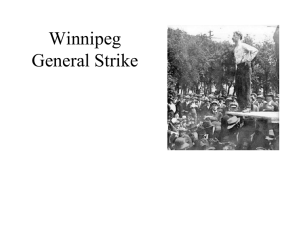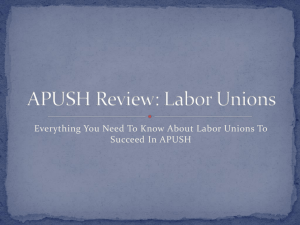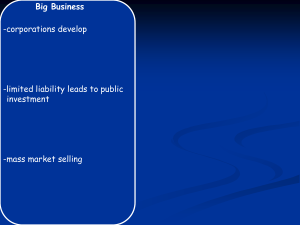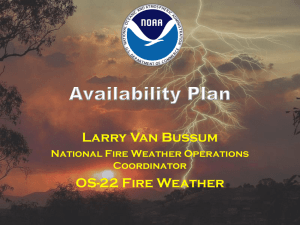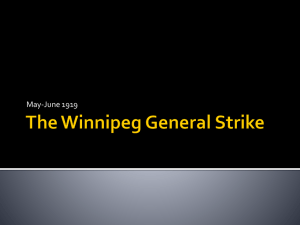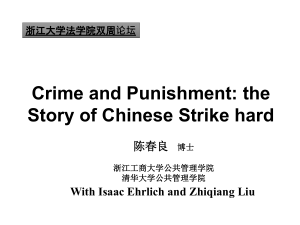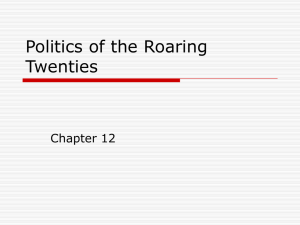Availability - National Weather Service Employees Organization
advertisement
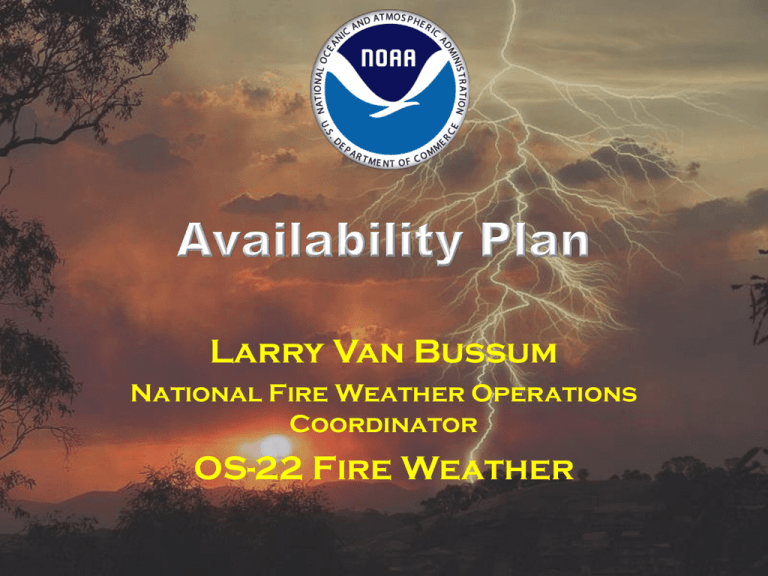
Larry Van Bussum National Fire Weather Operations Coordinator OS-22 Fire Weather • No Rotation/Plan • No requirement for personal availability from IMETs • Historically run critically low during height of fire season • Availability Calendar = 70% available • IMET Status Report = 35% ? • Need for program to have enough IMETs to support mission at any time • Need for management to plan • Need for IMET to get opportunities to go out • Need for IMET to get opportunities to take summer vacation Office BOI BYZ EKA FGZ GGW HNX LKN LOX MFR MSO MTR OTX PDT PIH PSR PQR REV SEW SGX SLC STO TFX TWC VEF MAR Positions 2 1 1 1 0 2 0 0 2 2 0 2 2 1 0 3 2 2 1 1 1 1 0 0 Staff 12 11 11 11 10 11 10 12 11 12 11 11 12 10 10 12 11 12 11 11 12 11 10 10 CYS BOU MPX LMK 1/2 1/2 1/2 1/2 10 11 10 NA sum 27 • MAR staffing: – Should always have someone “Active”: • BOI, MSO, PDT, PQR, SEW – Have 12+ base Met staff and were given 2 Fire MAR positions – Should always have someone either “Active” or in “Reserve”: • BOI, MSO, PDT, PQR, SEW, BYZ, EKA, FGZ, HNX, MFR, OTX, REV, SGX, SLC, STO, TFX, BOU – Have 11 base met positions and were given 1 or 2 fire MAR positions • Remainder rotate through 3 rotations Red Group Strike Team Alpha BOI* MSO* PDT* PQR* SEW* Strike Team Bravo HNX** BYZ** EKA** FGZ** Strike Team Charlie Gold Group Blue Group Strike Team Alpha BOI* MSO* PDT* PQR* SEW* Strike Team Bravo Strike Team Alpha BOI* MSO* PDT* PQR* SEW* Strike Team Bravo Strike Team Charlie Strike Team Delta Strike Team Charlie SGX** MFR** OTX** REV** Strike Team Delta Strike Team Echo LBF MTR BIS VEF Strike Team Fox CLE PSR EPZ MQT Strike Team Gulf FWD JAN RNK JAX MFL Strike Team Echo GJT LOX PIH RIW Strike Team Fox ILN TWC MAF BTV Strike Team Gulf HGX PAH MHX MLB HFO 22 22 Strike Team Delta BOU** SLC** STO** TFX** Strike Team Echo PUB GGW LKN CYS Strike Team Fox ILM ABQ DLH BGM Strike Team Gulf LZK JKL CHS TBW 21 2015 Pay Period (dates) (10 year average/Max ever out 8813) Active Group Reserve Group Inactive Group 1 (1/11 – 1/24) (1/3) RED GOLD BLUE 2 (1/25 – 2/7) (1/3) GOLD BLUE RED 3 (2/8 – 2/21) (1/3) BLUE RED GOLD 4 (2/22 – 3/7) (1/4) RED GOLD BLUE 5 (3/8 – 3/21) (1/3) GOLD BLUE RED 6 (3/22 – 4/4) (1/3) BLUE RED GOLD 7 (4/5 – 4/18) (1/4) RED GOLD BLUE 8 (4/19 – 5/2) (2/8) GOLD BLUE RED 9 (5/3 – 5/16) (3/12) BLUE RED GOLD 10 (5/17 – 5/30) (4/14) RED GOLD BLUE 11 (5/31 – 6/13) (5/11) GOLD BLUE RED 12 (6/14 – 6/27) (8/22) BLUE RED GOLD 13 (6/28 – 7/11) (9/28) RED GOLD BLUE 14 (7/12 – 7/25) (10/23) GOLD BLUE 15 (7/26 – 8/8) (11/27) BLUE RED RED GOLD 16 (8/9 – 8/22) (14/31) RED GOLD BLUE 17 (8/23 – 9/5) (14/34) GOLD BLUE RED 18 (9/6 – 9/19) (11/32) BLUE RED GOLD 19 (9/20 – 10/3) (7/19) RED GOLD BLUE 20 (10/4 – 10/17) (3/8) GOLD BLUE RED 21 (10/18 – 10/31) (2,9) BLUE RED GOLD 22 (11/1 – 11/14) (1,8) RED GOLD BLUE 23 (11/15 – 11/28) (1,7) GOLD BLUE RED 24 (11/29 – 12/12) (1,4) BLUE RED GOLD RED GOLD BLUE GOLD 25 (12/13 – 12/26) (0,2) 26 (12/27 – 1/9/2016) (0,2) BLUE RED • Active – All Strike Teams in Group available for immediate dispatch. NFWOC may standdown selected Strike Teams when fire activity or potential is low. • Reserve – National PL 1 – 3: No restrictions, deployment unlikely. If it appears Active Group will be tapped out, will notify select Strike Teams of possible activation with as much heads up as possible. – National PL 4 – 5: Select Strike Teams may be activated (by rotation). This would require possible cancellation of leave if IMET needs to be called up. • Inactive – National PL 1-3: No restrictions. Deployment unlikely. – National PL 4-5: Generally no restrictions unless Reserve Group fully activated. Will notify select Strike Teams of possible activation with as much heads up as possible. • Active rotation by proximity/needs, not “down the list” • Flexibility in activating Strike Teams that are proximate to fire activity and standing down those that will likely be unneeded. • NFWOC will assist MIC in finding coverage for times when office can’t cover Active rotation. • Can have IMET dispatched any time in Active 2 week period (so may be out beyond active period) • Annual rotation rotates (won’t always have to cover the same 2 week periods year after year) 2015 Pay Period (dates) (10 year average/Max ever out 8813) Active Group Reserve Group Inactive Group 1 (1/11 – 1/24) (1/3) RED (G) RED (F) RED (A,B,E), GOLD, BLUE 2 (1/25 – 2/7) (1/3) GOLD (F) GOLD (G) GOLD (A, C, E), BLUE, RED 3 (2/8 – 2/21) (1/3) BLUE (G) BLUE (F) BLUE (A, D, E), RED, GOLD 4 (2/22 – 3/7) (1/4) RED (F) RED (G) RED (A, B, E), GOLD, BLUE 5 (3/8 – 3/21) (1/3) GOLD (G) GOLD (E) GOLD (A, C, F), BLUE, RED 6 (3/22 – 4/4) (1/3) BLUE (F) BLUE (E) BLUE (A, D, G), RED, GOLD 7 (4/5 – 4/18) (1/4) RED (E) RED (B) RED (A, F, G), GOLD, BLUE 8 (4/19 – 5/2) (2/8) GOLD (F) GOLD (A) GOLD (C, E, G), BLUE, RED 9 (5/3 – 5/16) (3/12) BLUE (E, F) BLUE (D) BLUE (A, G), RED, GOLD 10 (5/17 – 5/30) (4/14) RED (B, G) RED (A, F) RED (E), GOLD, BLUE 11 (5/31 – 6/13) (5/11) GOLD (C, E) GOLD (F) GOLD (A,G), BLUE, RED 12 (6/14 – 6/27) (8/22) BLUE (A, F, G) BLUE (D, E), RED (E) RED (A, B, F, G), GOLD, BLUE 13 (6/28 – 7/11) (9/28) RED (A, B, E, F, G) GOLD (F, G) GOLD (A, C, E), BLUE 14 (7/12 – 7/25) (10/23) GOLD (A, C, E, F, G) BLUE (E) BLUE (A, D, F, G), RED 15 (7/26 – 8/8) (11/27) BLUE (A, D, E, F, G) RED (B, E) RED (A, F, G), GOLD, BLUE 16 (8/9 – 8/22) (14/31) RED (A, B, E, F, G) GOLD (E, F, G) GOLD (A, C), BLUE 17 (8/23 – 9/5) (14/34) GOLD (A, C, E, F, G) BLUE (D, E, F, G) BLUE (A), RED 18 (9/6 – 9/19) (11/32) BLUE (A, D, E, F, G) RED (B, F, G) RED (A), GOLD 19 (9/20 – 10/3) (7/19) RED (A, B, G) RED (E, F) GOLD, BLUE 20 (10/4 – 10/17) (3/8) GOLD (C, E) GOLD (F) GOLD (A, G), BLUE, RED 21 (10/18 – 10/31) (2,9) BLUE (D, G) BLUE (E) BLUE (A, F), RED, GOLD 22 (11/1 – 11/14) (1,8) RED (E) RED (A) RED (B, G, F), GOLD, BLUE 23 (11/15 – 11/28) (1,7) GOLD (G) GOLD (C) GOLD (A, E, F), BLUE, RED 24 (11/29 – 12/12) (1,4) BLUE (A) BLUE (G) BLUE (D, E, F), RED, GOLD 25 (12/13 – 12/26) (0,2) 26 (12/27 – 1/9/2016) (0,2) RED (B) GOLD (F) RED (G) GOLD (C) RED (A, E, F), GOLD, BLUE GOLD (A, E, G), BLUE, RED • • • • • • By Pay Period Able to plan months ahead Ensures availability Ensures each office contributing Flexible Similar to rotation at NIFC for their incident management teams • “Why run this all year, why not just during the busy fire season?” – By using the rotation plan all year, it promotes comfort in using the system. In addition, while incidents during the winter holidays are rare, they do occur and this ensures that there will be an IMET available during the holiday season should an incident happen. It will not be the same office/IMET every year. • What about leave (IMET)? – The IMET program is voluntary and as such part of volunteering is that one volunteers to commit to supporting the mission, especially during peak fire season. Right now that expectation is 365 days a year. With this new plan, there is actually many more windows of opportunity to take leave while still ensuring the mission is supported. • What about leave (staff)? – As much leave should be granted that ensures the employees’ right to leave while still supporting the mission of the NWS. This pertains to fire as well, and we have a mission to support fire. We have a responsibility to staff in a way that we ensure that availability. Currently we ask office to ensure this 365 days a year, which is unrealistic. This plan allows windows of opportunity while still supporting the NWS mission. • “What if my office is short staffed? What about midnight shifts?” – Currently we ask IMETs to be available any time. Under the new plan, midnight shifts could be planned around times when the IMET is scheduled to be on rotation. If the office is short staffed due to vacancies, they can work with the NFWOC in Boise to find a replacement from the “Bullpen”. • How do you want me to schedule shifts and leave around this plan? – Just as you would for any other “season” that you must plan for (Severe, flooding, tropical, etc.) Given that it is peak summer leave season, you should grant as much leave as you can while still ensuring that if your office is called upon for an IMET, you can fulfill the mission. Shifts should be planned so that the IMET is easily taken out of rotation and backed up with minimal disruption to the remaining staff. • Keep in mind, the OT at the office is paid by the fire agencies, so this allows a bit more leeway in covering shifts (especially for those willing to work voluntary OT and/or Double Shifts).
